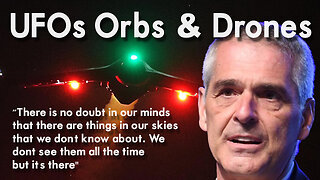Premium Only Content

Abba, Father!
“After we die, well, lights out!” he said with a smile on his face. That was pretty much the extent of his beliefs about eternity, despite his church upbringing. Fernando, a guy I was talking with at the park, seemed comfortable with his belief that this life is all there is, which always leaves me somewhat astounded. I can’t imagine this short life without the hope of life eternal. How do unbelievers face eternity and the prospect of death so casually?
For Fernando, I think part of the reason is his view of God as nothing more than a “higher power”. This impersonal view of God leaves nothing to look forward to but an impersonal eternity. It might seem convenient when it comes to not having to take personal accountability for our sins, but when it comes to eternal life, the prospect of “lights out” after this life seems preferable to an impersonal future.
But God is very personal. The Bible tells us we are made in God’s image, which means we were created to relate to God in a deeply personal way. But our sin actually estranges us from God, so much so that we were condemned as enemies and unable to be reconciled on our own.
And this is where God steps in once again, in a deeply personal way: “God sent his Son, born of a woman, born under the law, to redeem those under the law, that we might receive adoption to sonship. Because you are his sons, God sent the Spirit of his Son into our hearts, the Spirit who calls out, “Abba, Father.” So you are no longer a slave, but God’s child; and since you are his child, God has made you also an heir. (Gal. 4)
There is a huge difference between thinking of God as a “higher power” and being able to refer to God as “Abba, Father.” “Abba” is a term of endearment, similar to a child’s reference to a human father as “Daddy”. We are invited into a personal relationship with our Father God, and to be adopted into His family, a far cry from an impersonal eternity.
Maybe Fernando’s hope of “lights out” makes sense with his view of an impersonal “higher power” and an impersonal future. But “Abba, Father” makes all the difference when it comes to how we view eternity.
-
 LIVE
LIVE
LFA TV
12 hours agoDING DONG THE BILL IS DEAD! | LIVE FROM AMERICA 12.19.24 11am EST
1,753 watching -
 37:31
37:31
BonginoReport
4 hours agoShut It Down (Ep.108) - 12/19/2024
56.9K176 -
 LIVE
LIVE
Vigilant News Network
16 hours agoBUSTED: ‘The View’ Co-Host May Face Criminal Investigation | The Daily Dose
2,214 watching -
 2:02:09
2:02:09
Film Threat
14 hours agoSUPERMAN TRAILER LIVE REACTION | Film Threat Livecast
34.9K4 -
 47:27
47:27
PMG
10 hours ago"Hannah Faulkner and Jeremy Harrell | LIVE FROM AMERICA!!!"
339 -

2 MIKES LIVE
1 hour agoTHE MIKE SCHWARTZ SHOW with DR. MICHAEL J SCHWARTZ 12-19-2024
7.36K2 -
 4:45
4:45
Gamazda
15 hours ago $12.95 earnedGuns N' Roses - Sweet Child O' Mine
59.4K47 -
 1:25:28
1:25:28
CarlCrusher
17 hours agoUFO Plasma ORBs & Drones Above New Jersey | Catching REAL PROOF with Dr Jim Segala
51.9K22 -
 24:40
24:40
Degenerate Plays
1 day ago $4.11 earnedI Put A Bounty On This Phone Addict - Madden NFL 09 : Part 1
31.7K1 -
 18:29
18:29
Bearing
1 day agoCrazy Democrat Lady Thinks THE DRONES Are Coming For TRUMP & MAGA
28.6K60